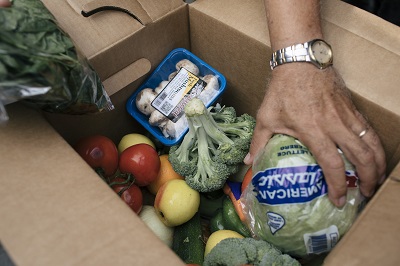Every five years, Congress passes a new Farm Bill, and 2023 is our year to influence this vital bill. The Farm Bill supports our nation’s farmers, promotes rural development, and protects critical nutrition programs. Almost three-quarters of the bill’s funding supports programs such as The Emergency Food Assistance Program (TEFAP) and Supplemental Nutrition Assistance Program (SNAP).
FAST FACTS ON SNAP AND TEFAP
SNAP is our country’s most effective anti-hunger program which is why River Bend Food Bank helps people sign up for SNAP. But SNAP supports our communities in other ways as well:
- For every meal provided by food banks, SNAP provides nine meals;
- Two-thirds of those who receive SNAP benefits are among our most vulnerable, including children, seniors, and people living with disabilities; and
- Every dollar spent in SNAP benefits helps generate between $1.50 and $1.80 in local economic activity.
TEFAP provides nutritious food to families and supports farmers and growers by purchasing U.S.-grown food. It is a lifeline for rural communities. River Bend Food Bank relies on programs like The Emergency Food Assistance Program (TEFAP) to keep shelves stocked. In FY2022, USDA programs like TEFAP accounted for 18 percent of food distributed – apx. 4.2M meals.
POLICY PRIORITIES
To strengthen SNAP in the 2023 Farm Bill, Congress should:
- Increase SNAP’s purchasing power by basing benefits on the Low-Cost Food Plan (rather than the Thrifty Food Plan). This will set benefit levels on a more realistic market basket and match the true cost of food, which is especially important given inflation.
- Streamline eligibility and enrollment by improving and simplifying applications, e.g., by combining applications (such as SNAP, WIC, Medicaid), making telephonic signatures a national option, and reducing the number of in-person visits required to authorize programs.
- Improve upon SNAP’s well-designed structure to allow for a more gradual tapering of benefits as program participants earn more income. This will stave off the “benefits cliff” and a more stable transition toward economic self-sufficiency.
To strengthen TEFAP in the 2023 Farm Bill, Congress should:
- Increase mandatory funding by $250 million per year for food purchases to ensure the flow of TEFAP foods remains steady throughout the food assistance network and support the U.S. agricultural economy.
- Authorize $200 million per year for TEFAP storage and distribution funds and $15 million per year for TEFAP infrastructure grants. Food banks rely on a network of anti-hunger partners to distribute food. The safe and efficient distribution of food requires investments in cold storage and transportation.
- Bolster the Farm to Food Bank Program by increasing funding for this program, removing the state match, and allowing states to prioritize projects for donated food or food purchased at a low cost from local growers and producers. In addition to supporting supply chain resiliency, these investments have a stimulative effect on local economies.
HOW YOU CAN GET INVOLVED
- Learn more about the Farm Bill through these informative “Farm Bill 101” webinars by the Greater Chicago Food Depository.
- Tell Congress you want them to support a strong, bipartisan Farm Bill that strengthens anti-hunger programs. This link allows you to send a letter via text, Facebook, WhatsApp, etc. You can also download an image to share with your friends and family.
- Share our Facebook post on the importance of the Farm Bill.
- Call your Senators and Congresspeople – You can use our petition or write your own letter (sample language below)
- Write an letter to the editor in your local newspaper (sample language below)
- Read our Advocacy Toolkit for other ideas (pages 18-28 are all about contacting Congress)






